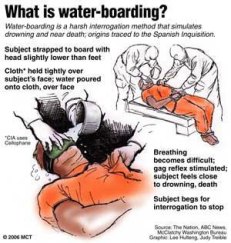Corrupt Newspapers ‘softened’ Torture After U.S. began Using it
July 2, 2010 1 Comment
By Luis R. Miranda
The Real Agenda
July 2, 2010
Torture, as a tool to obtain information from a human being is disgusting, inhumane and illegal by all measurements in past and

Do as I say, not as I do. This seems to be the motto of the torturers and the pandering media.
modern societies. It is unthinkable that anyone with red blood in their veins could consider it acceptable to torture a person in order to obtain information that as it has been widely demonstrated, (1) has never provided any useful details to prevent a disaster. In the western world, torture is mostly seen as unjustified, (2) and only some power men who control the militaries of the world still agree to use torture in various forms to get details of ‘plots’ to attack the free world. Only a population that never experience torture as a tool to criminalize citizens could hesitate before the question, Is Torture Ever Justified? (3)
How would public perception change if the media that feeds propaganda to them on a daily basis simply began to indirectly condone or soften torture as a tool the government uses in times of war? A study conducted by Harvard reveals that the four newspapers with more circulation in the U.S. effectively mischaracterized the use of waterboarding -as a form of torture- after it was discovered the United States waterboarded and humiliated prisoners. (4) The study conducted by Law students at Harvard says that The New York Times, the USA Today, the Los Angeles Times and the Wall Street Journal either refused to call waterboarding torture or did it in only and handful of their articles that talked about the use of torture by the United States.
We found a significant and sudden shift in how newspapers characterized waterboarding… … from 2002‐2008, the studied newspapers almost never referred to waterboarding as torture. The New York Times called waterboarding torture or implied it was torture in just 2 of 143 articles (1.4%). The Los Angeles Times did so in 4.8% of articles (3 of 63). The Wall Street Journal characterized the practice as torture in just 1 of 63 articles (1.6%). USA Today never called waterboarding.
According to the study, newspapers were more likely to call waterboarding torture if another country was the perpetrator of the crime.
The New York Times, 85.8% of articles (28 of 33) that dealt with a country other than the United States using waterboarding called it torture or implied it was torture while only 7.69% (16 of 208) did so when the United States was responsible. The Los Angeles Times characterized the practice as torture in 91.3% of articles (21 of 23).
Although waterboarding has been debated and talked about since the beginning of the century, it was never so close to home as it has been in the last decade. After 9/11, and in the middle of a careless campaign to hunt a nonexistent enemy, the U.S. launched a military assault in Iraq and Afghanistan to find and kill the murderers who had killed innocent Americans. There was very little concern in the public’s mind as to how this goal was achieved and what would it take to bring them to justice. Then came Abu Ghraib (5) and a mass awakening took place. Was the U.S using the very same techniques it had condemned in the past? The answer was YES.
Harvard’s study examined the newspapers’ coverage using electronic databases. ”Our research team word searched for the term “waterboarding”, these included classifying the practice as “torture,” giving it some lesser, negative classification (such as calling waterboarding “inhuman”), giving it a softer, less negative classification (such as calling waterboarding “objectionable”), or not characterizing the practice at all.” The study analyzed the reporting of four major newspapers using Proquest, LexisNexis, and the NY Times website archives. Read more about the methodology on page 5 of the study.
“The results of this study demonstrate that there was a sudden, significant, shift in major print media’s treatment of waterboarding,” concludes the study. After the Abu Ghraib scandal, the four studied newspapers changed the word torture for “harsh” and/or “coercive”, to describe waterboarding. This behaviour was seen both in articles considered as “news” as well as those classified as “opinion”. Although Harvard’s study does not provide any possible reason why this change in wording occurred, it does cite an article by New York Times editor Clark Hoyt, who said that this behaviour was a deliberate decision made by Journalists and Editors in an effort to remain “neutral”.
The study refutes Mr. Hoyt’s statement with the fact newspapers comfortably called waterboarding and other practices of the sort “torture” before 9/11 and even before 2004 without any reserves. Another reason why Mr. Hoyt’s affirmation is baseless, is that waterboarding had been labeled torture and an illegal practice by American law, international law, and the very same newspapers that now justify their actions by calling themselves “neutral”.
(1) http://www.independent.co.uk/opinion/commentators/fisk/robert-fisk-torture-does-not-work-as-history-shows-777213.html
(2) http://online.wsj.com/public/resources/documents/military_0604.pdf
(3) http://hotair.com/archives/2009/12/04/pew-poll-public-support-for-torture-at-five-year-high/
(4) http://www.hks.harvard.edu/presspol/publications/papers/torture_at_times_hks_students.pdf
(5) http://www.antiwar.com/news/?articleid=8560
